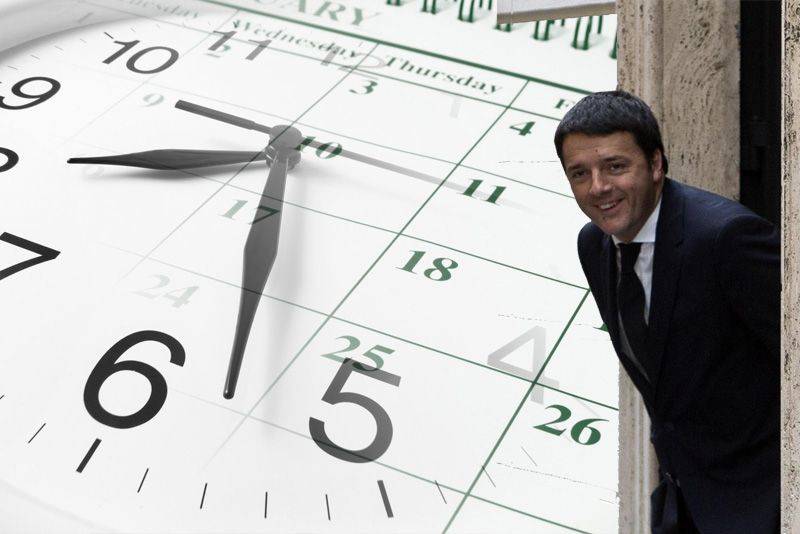Deadlines Loom: Berlusconi Future, Senate Reform, EU Vote
ROME - Three deadlines are approaching on the turbulent Italian political agenda: former premier Silvio Berlusconi's future of either house arrest or social services; the government's proposed slimming of the Italian Senate; and a European Parliamentary vote that will be viewed as a litmus test of the relative strengths of the Italian parties.
A decision by the high court is slated for Friday, April 10, on whether Silvio Berlusconi, following his conviction for tax fraud, will be assigned to house arrest or, as he notoriously prefers, some form of social service--preferably, the sort of a weekly or so chat with a social work counselor that will not confine him to his home. The issue is sufficiently dramatic that Berlusconi called at the Quirinal Palace for a private meeting Thursday with President Giorgio Napolitano. Berlusconi's somewhat humiliating goal was to seek presidential protection from house arrest, which would eliminate his possibility to campaign on behalf of his reborn party, Forza Italia (FI), for up to two years. Did the president agree? He seems to have agreed to Berlusconi's request for an audience, but by all accounts, to nothing more than that.
The second deadline is a vote on Senate reform, whose outlines were agreed upon by Premier Matteo Renzi in a private meeting with Berlusconi in January. The reform would reduce the Senate, which currently has 315 elected members plus a small number of appointed lifetime members (at present, five), in power and size into an unelected regional body. Renzi's aim is to slim down and reduce Senate power so as to save money and to make Italy more efficient, by disallowing it to stall legislature passed by Parliament. Aside from his desire to whittle down the Senate, the January meeting was of vital importance for Renzi because it pushed Grillo onto the sidelines. Berlusconi took even greater benefit because it relaunched him onto the political stage as a major player.
However, on Saturday Berlusconi called Renzi's current version of the reform "unacceptable and undigestible" even though, as Berlusconi acknowledged later in the day, he still considers Senate reform necessary, but in need of renegotiation.
Elsewhere too the go-for-broke Premier Matteo Renzi is encountering unexpected opposition, including from the authoritative president of the Senate, the former magistrate Piero Grasso, to the point that Renzi has threatened to resign if his version of a much diminished upper house flops. The word "virtual" should be added to the threat: would Renzi really resign?
And in the end, will those challenging him, beginning with Berlusconi, really stick to their guns, at the price of throwing Italy into chaos? According to a count by Reuters, the Renzi coalition would still have a theoretical majority in the Senate of 169 votes to 139--but not enough for the Senate to vote itself out of its present existence.
The third deadline is the forthcoming general election for the European Parliament. This eighth European Union vote is particularly important. With 751 members representing almost 504 million Europeans, Italy will have 73 seats, representing almost 10% of the Parliament. The last such election took place in 2009, before the effects of the recession were felt. As the president of the European Commission, Jose Manuel Barroso, said recently, "We are seeing an increase in right- and left-wing extremism," or what other concerned pundits call "centrifugal forces." Certainly anti-European (and anti-German) sentiment is now more widespread than in any past election. The Euro is an easy target, and anti-establishment politicians here are blaming it for the recession. This is bound to be reflected in the vote.
To take place in Italy on May 25, this will test the relative strengths of the trio of dominant parties. At the moment, Renzi's Partito Democratico (PD) continues to lead the pack, with almost 35% of the vote, but has begun to shed voters, according to a poll by the reliable SWG conducted April 4. The Movimento Cinque Stelle (M5S), headed by the noisy, truculent Beppe Grillo, is running second at around 20%, but like the PD is beginning to show a slight decline over previous weeks. Following Grillo's fractious party is Silvio Berlusconi's reborn, but already deeply troubled, Forza Italia (FI). SWG gives FI around 19.5%; Berlusconi himself claimed yesterday that his own pollster gives him around 22% while yet another polling organization, Ixe, gives Berlusconi almost 23%.
What this means is that the distance between the parties led by Berlusconi and Grillo is now narrow enough that any prediction of what may actually happen at the polls is risky. One reason: the Nuovo Centrodestra, the splinter party headed by Angelino Alfano that broke with Berlusconi over support of the Renzi government, commands the loyalty of at least 3.5% of the voters. When push comes to shove in the voting booth, some of these may shift to Forza Italia.





































i-Italy
Facebook
Google+
This work may not be reproduced, in whole or in part, without prior written permission.
Questo lavoro non può essere riprodotto, in tutto o in parte, senza permesso scritto.